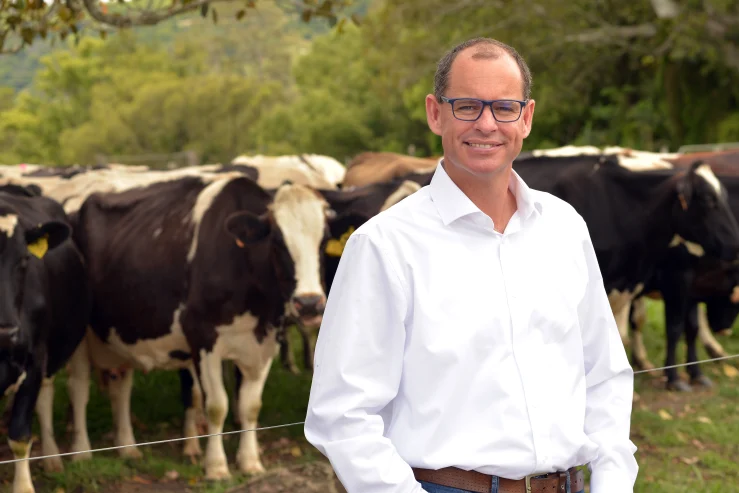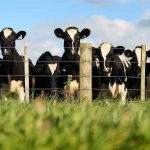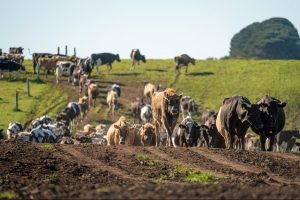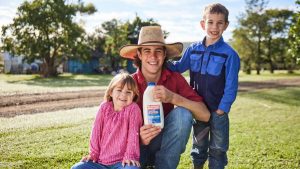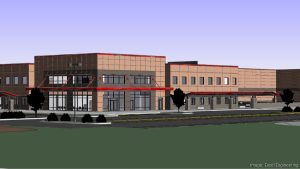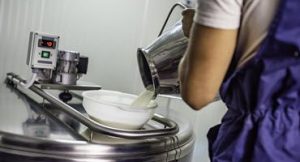
The daughter of Michael Hampson, the chief executive of Australia’s oldest dairy co-operative, Norco, doesn’t drink milk.
“As much as I love her dearly … As much as that really irritates me, she doesn’t buy dairy,” Hampson says. “It’s a bit of a joke everywhere I go.”
But that doesn’t mean she’s not a customer. The 128-year-old dairy business, formed in Byron Bay by over 300 farmer-members who collectively own one of Australia’s longest-standing supermarket brands, has been undergoing a quiet transformation. It’s made bold moves to partner with lab-made milk start-up Eden Brew and has launched pea and oat “mylk” that has won over Hampson’s daughter, who has an allergic reaction when she consumes dairy.
“There’s a lot of people out there that choose or have to avoid dairy,” says Hampson, who had a 16-year career at Bega Group before joining Norco. “Either they make a decision that they don’t want to buy dairy products any more, or there’s some form of medical health reason that says they can’t.
“Providing a product for [my daughter] doesn’t mean we’re taking [dairy’s] business … We can make money out of it to support our farmers and our communities and our people.”
Hampson, who took the top job in October 2019, has orchestrated a turnaround of the dairy co-operative, which he says was suffering from decades of stagnancy and inaction.
Starting from the company board, poor corporate governance structures had infected the business, he said, resulting in a malignant workplace culture in which managers and staff felt discouraged from trying new, better ways of doing business for fear of being jeered by their peers.
“It was silos; it was people at war. It was this terrible, terrible culture,” he says.
“There was at least two decades’ worth of work and change in modernisation and commercialisation and commercial activity that needed to be addressed when I arrived.”
Hampson’s appointment was part of a wider governance overhaul that included a refreshed board and a new hand-picked executive team. Various aspects of the organisation’s operations and milk production were revisited, from product design to pricing and branding architecture. Norco’s bottom line became much healthier: when Hampson joined, bank overdrafts were at their limit, the business owed $15 million to unpaid creditors and a $30 million term loan was also at its limit.
‘It was silos, it was people at war, it was this terrible, terrible culture, which had obviously started at the top.’ Michael Hampson, Norco chief
“This year we’re paying our farmers over $30 million more for their milk, which is fantastic. We’ve made more operating profit in the last four years than what Norco’s made in the last 30 years,” says Hampson. Norco’s turnover for 2022 was $651 million.
“And we’re not an overly profitable organisation; we’re all about the farmers. But Norco didn’t make any money, or used to make a loss all the time. We’ve been able to change the trajectory of the organisation and really support our farmers because that’s what we’re all about.”
Arguably the biggest feather in Hampson’s cap is an achievement harder to measure: reshaping the company’s culture and approach to innovation. The top 30-odd managers in the business are now very supportive of and willing to help one another “to a fault”, Hampson says. In July 2021, Norco announced its partnership with lab-made milk start-up Eden Brew. The launch of pea and oat mylk came in March this year. Both moves have raised eyebrows among a handful of rusted-on dairy industry stalwarts.
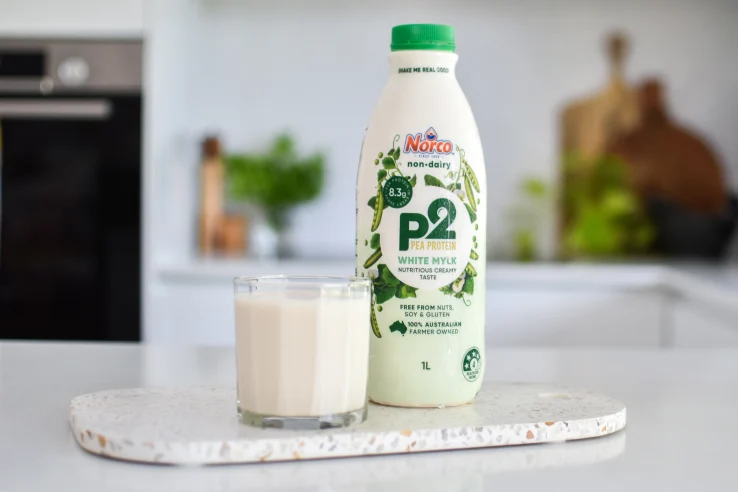
But the way Hampson sees it, there’s no conflict. The decisions are more commercial and strategic in nature than they are philosophical.
“We are basically a nutrition beverage business … that’s what we’re about, providing nutrition in a bottle,” he says. “There’s a whole market out there that’s not drinking dairy, so either we say to ourselves, look, we’re not going to address that market, but that market’s growing.
“At the end of the day, you’ve got to fish where the fish are.”
Selling the idea of cowless milk to dairy farmers
It took a bit of time for some staff to come around to the change of direction. The chief executive believes just 40 per cent of people within the business got on board with plant-based milk from the beginning, a figure he estimates has now doubled. An initial 20 per cent who were “vehemently against it” has dropped to some 5 per cent. Adding plant-based and lab-made milk to Norco’s portfolio simply expanded the company’s revenue streams, which include ice cream, agricultural supplies, stock feeds, feed mills and grain trading, he said.
“We shouldn’t have a policy and a culture of discounting the value of our farmers’ produce. And that’s exactly what’s been happening in dairy.” Norco CEO Michael Hampson
Amid a raft of recent changes to the organisation, one thing hasn’t wavered: an uncompromising focus on farmers. The rising popularity of plant-based milk is happening in concert with the declining pool of Australian milk, which Hampson says is driven by a number of factors: six years of bad weather that inflicted serious damage to its Lismore ice cream factory; the eight-year-long reign of $1-a-litre milk that pushed down farmer profits, which is part of the reason many have exited the industry; and concomitant difficulties with succession planning as farmers’ children are increasingly unwilling to take over the family business.
“They stopped dairy farming,” says Hampson. The cost of establishing a dairy farm – buying the cows, securing the land – comes up to about $8 million, he says.
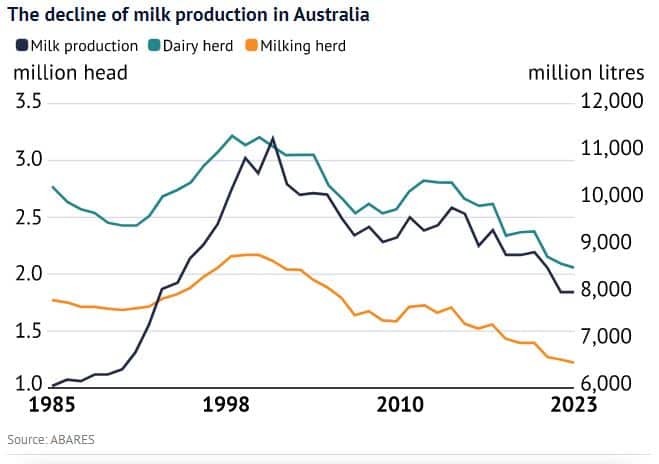
“Why would I get up at 3.30 in the morning to bring the cows in to milk and every day, seven days a week, including Christmas Day?
“People just aren’t going to do that if they’re going to make $50,000 a year.”
Earlier this year, Norco commissioned the National Farmers’ Federation to conduct a survey into farmers’ wellbeing. The survey found nearly half of the 1300 respondents had contemplated suicide or self-harm. About one in three had tried. Most farmers – 76 per cent – no longer felt valued by the public.
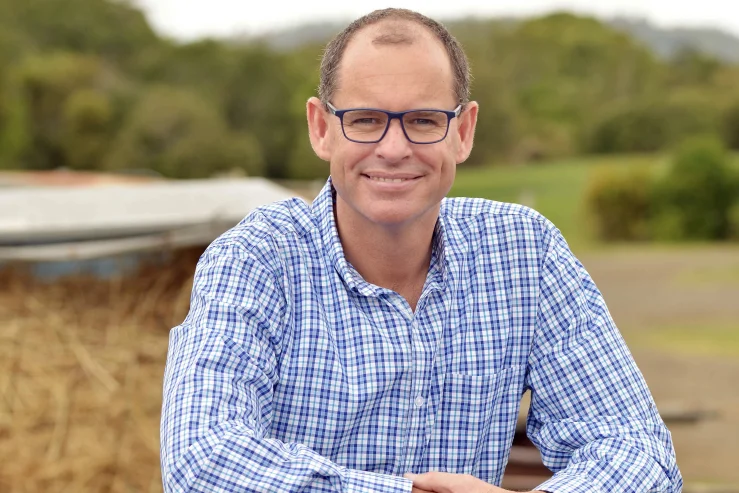
“We as a country have got used to having very cheap food. But it’s come at the expense of farmers … We’ve got to stop that,” says Hampson. “Because the flip side is farmers going broke, and all these mental health and wellbeing issues.”
He believes the fair price for dairy milk should be at least $2 a litre, regardless of whether that’s private-label or branded.
It’s currently cheaper than water, he says, but it shouldn’t be. “I can go buy water in the shop in a fancy bottle and it’s $5 a litre.
“We shouldn’t have a policy and a culture of discounting the value of our farmers’ produce. And that’s exactly what’s been happening in dairy.”
